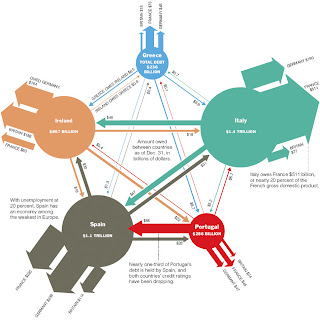
Wednesday, April 28, 2010
School daze

Sunday, April 25, 2010
Young, restless and ... unemployed?
 Youth who are full-time students are not counted in these numbers, meaning that countless young adults (well, not entirely countless - some reports say up to 15 million) who reside in relatively affluent countries are without a job or education. In Spain, which suffers from high unemployment across the board, nearly 40 percent of the youth is unemployed.
Youth who are full-time students are not counted in these numbers, meaning that countless young adults (well, not entirely countless - some reports say up to 15 million) who reside in relatively affluent countries are without a job or education. In Spain, which suffers from high unemployment across the board, nearly 40 percent of the youth is unemployed.One reader of the Times' report on these numbers made an astute observation:
Basically all this is measuring is the effects of education on employment status. Those who are 15 to 24 are either full time students (and thus not counted in employment statistics at all), or are high school dropouts and/or those with only high school educations. It shouldn't be surprising that they find themselves unemployed at higher rates than those who graduate from college and/or have more experience in the workforce.
The value of a college education is a rarely disputed fact. But in the current economic climate, the normal laws of education and job possibilities do not necessarily apply. In countries around the world, college graduates are forced to take jobs for which they are overqualified because there is nothing else available. Consequently, those who have no college education at all -but in a vacuum would be qualified for these entry-level positions - are left without employment. This is the case in Spain, where "the risk of overeducation" has become a conscious phenomenon. Youth are opting out of college because the rewards of attending are no longer worth the time and cost. In effect, the opportunity cost of a college education has become too high - especially if unemployment is the result nonetheless.
For those with money to spare, unpaid internships have become the option. But for those without a college education or a fallback option, what do these facts mean? Is an entire generation, worldwide, being crippled by the economic crisis? If youth are unemployable and therefore unable to gain beginner experiences, how will they ever rise up? Though the numbers do not appear to exist, statistics on the employment of those aged 25-30 would be helpful for understanding the implications of this mass unemployment.
For more: a video by the Organization for Economic Cooperation and Development on what these statistics mean.
Thursday, April 22, 2010
She works hard for the money
Tuesday, April 20, 2010
A coffee or a child?

Sunday, April 18, 2010
The short of it


Friday, April 16, 2010
T-T-T-Telephone
Wednesday, April 14, 2010
Girl power
Saturday, April 10, 2010
No pay, no gain?
1. Each person has an equal claim to a fully adequate scheme of equal basic rights and liberties, which scheme is compatible with the same scheme for all; and in this scheme the equal political liberties, and only those liberties, are to be guaranteed their fair value.
2. Social and economic inequalities are to satisfy two conditions: (a) They are to be attached to positions and offices open to all under conditions of fair equality of opportunity; and (b), they are to be to the greatest benefit of the least advantaged members of society.
Unpaid internships clearly fail the test when the second point is brought into the conversation. Though there are no explicit barriers to the positions, opportunity cost keeps the jobs from being open to all members of society. And unpaid internships clearly are not to the greatest benefit of the least advantaged. But does that mean they should be dismissed altogether?
While all students may not have the economic liberty to engage in a job where they will receive no payment, internships provide undeniable levels of opportunity. According to welfare-based principles, "material goods and services have no intrinsic value and are valuable only in so far as they increase welfare." Though there is no immediate monetary value that results from an unpaid internship, the long-term benefits in experience and networking ultimately do increase welfare. And when an intern is serving a nonprofit or the public sector, welfare for all theoretically increases as well.
So while it probably should not be legal for a for-profit company to shirk their interns — a matter the Department of Labor is already looking into — unpaid internships all across the board should not be dismissed out of hand. As long as opportunities are made available to all students, through counseling from universities, grants and stipends, unpaid internships do have the potential to further societal and personal welfare.
Friday, April 2, 2010
The games we play (and the consequences they hold) — part III

Buying stolen properties, pimpin hoes, building crack houses and projects, paying protection fees and getting car jacked are some of the elements of the game. Not dope enough?...If you don't have the money that you owe to the loan shark you might just land yourself in da Emergency Room.
